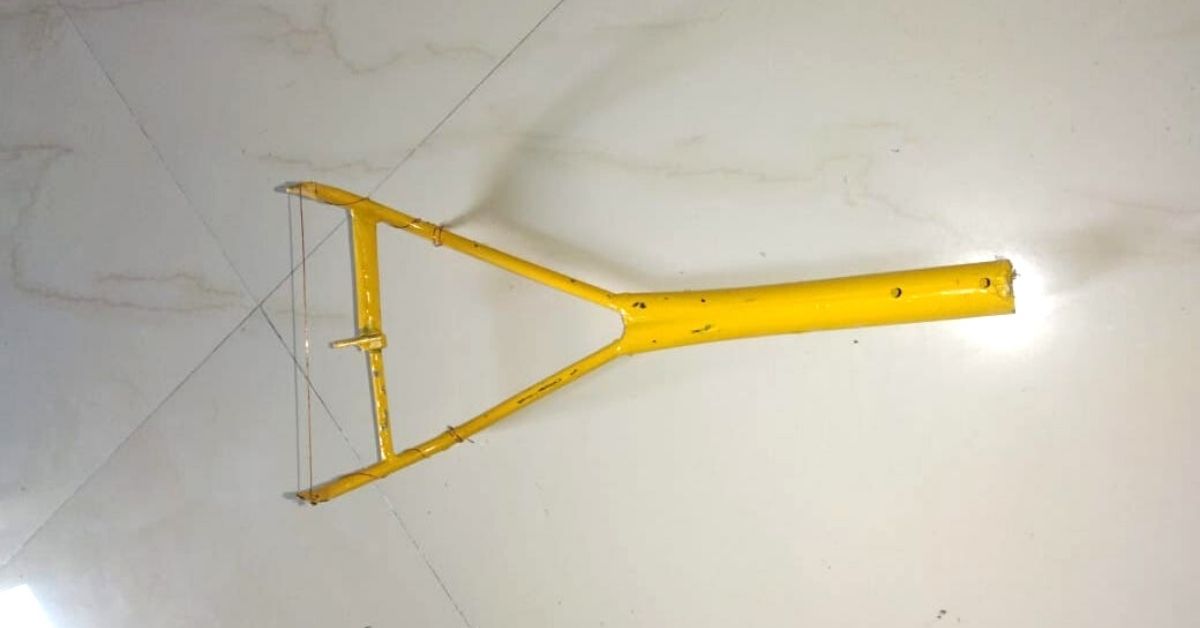Labour scarcity is an issue pertinent to agriculture. The high cost of wages and irregular agricultural activities hampers the productivity of crops and, at times, even compels farmers to change their farming patterns.
Ashok Jadhav from Chinchner village in Satara, Maharashtra, faced similar issues. Having begun farming on his 2-acre ancestral land after retiring from a private company as a machinist, he says, “I have been practising farming since 1999. I grow sugarcane, soybean, turmeric, tomato and other seasonal vegetables. However, I switched to organic farming, which gave rise to the issue of weeds.”
The 71-year-old says that organic farming involves using abundant natural fertilisers, which leads to unwanted weed growth. These weeds consume the nutrients of the soil and affect plant growth.
To solve this issue, Ashok started using weedicide on the farm. “Though it was an effective solution, the chemicals defeated the purpose of growing food organically. Moreover, it started deteriorating the soil quality. We needed a healthier solution for the soil,” he says, adding that he began hiring labour for the task.
“However, labour costs were high, and I could not afford to spend Rs 20,000 on labourers that I occasionally needed,” he explains.
A Solution For Just Rs 400

Ashok says that it was then that he started thinking of innovative ideas to address the problem. “I reached out to agriculture experts from the government department and created a bicycle weeder that would cut the weeds along the side of the crops. The wheels had blades attached to them, which removed the weeds. But it did not remove the weeds growing between the crops,” he adds.
Looking for a better alternative, he visited agriculture exhibitions to identify tools or equipment to find an affordable solution. But to no avail.
“In 2018, I decided to experiment with a makeshift solution. I took two iron rods, bent them at each of their ends and attached a thin metal wire of 8-10 inches in between, joining the two rods with a metal pipe as a handle,” Ashok says. The device requires manually pulling out the weeds, and the metal wire cuts them by the root.
The tool worked and made it accessible to remove the weeds in congested crops and minor gaps. However, the metal wire broke due to the tension of the weeds or because of its thick stems. “At times, the wire lost the tension between the metal rods and hurt the hand and shoulders,” he says.
Over the next two years, Ashok made multiple changes to the device. “I improved the angle to bend the iron rods, and fitted a metal piece to support the cutting wires. I learned that a 7-inch metal wire served the best in terms of efficiency and performance. The thin metal wires were replaced with used cable wires from two-wheeler brakes,” he says, adding that his previous experience of working as a machinist came in handy during the process.
To make the tool lighter, he replaced the metal handle with bamboo. “It helped to overcome the shortcomings to a huge extent. Earlier, it required 10 labourers to work the entire day on one-acre of land, which cost Rs 3,000 per day. But now the same work can be done by a single person in two days for around Rs 300,” he says.
Ashok says that the device has no moving parts and is low maintenance.
Watch: 71-YO Farmer Ashok Demonstrates His Deweeding Innovation
When he shared the pictures and video of the device on social media, he received tonnes of inquiries from farmers. “I made about 400 devices and gave them to farmers in neighbouring areas. As more orders poured in, I collaborated with a local workshop and started selling them for Rs 400 a piece, earning minimal profits,” he says.
Satish Munje, a Satara-based farmer, says that he purchased the device and has saved a significant sum of money on labour costs. “I used to spend Rs 40,000 alone on labourers to remove weeds on my 2.5-acre farm. However, my costs have come down significantly with this device. I now spend Rs 5,000 on one labourer who gets the job done,” he says.
Ashok claims to have sold about 5,000 devices so far. “I get queries from across the state, including Aurangabad, Kolhapur, Pandharpur, Yavatmal and others. Recently, I received an order from Punjab, Karnataka and Madhya Pradesh,” he adds.
Ashok aims to conduct workshops for farmers on building the device and come up with other innovative solutions in farming.
“I am glad that my makeshift arrangement is helping thousands of farmers save money, time and effort to solve such a frequent problem in the farming community,” he says.
If you would like to order the device call, 9527949010.
Edited by Yoshita Rao
No comments:
Post a Comment